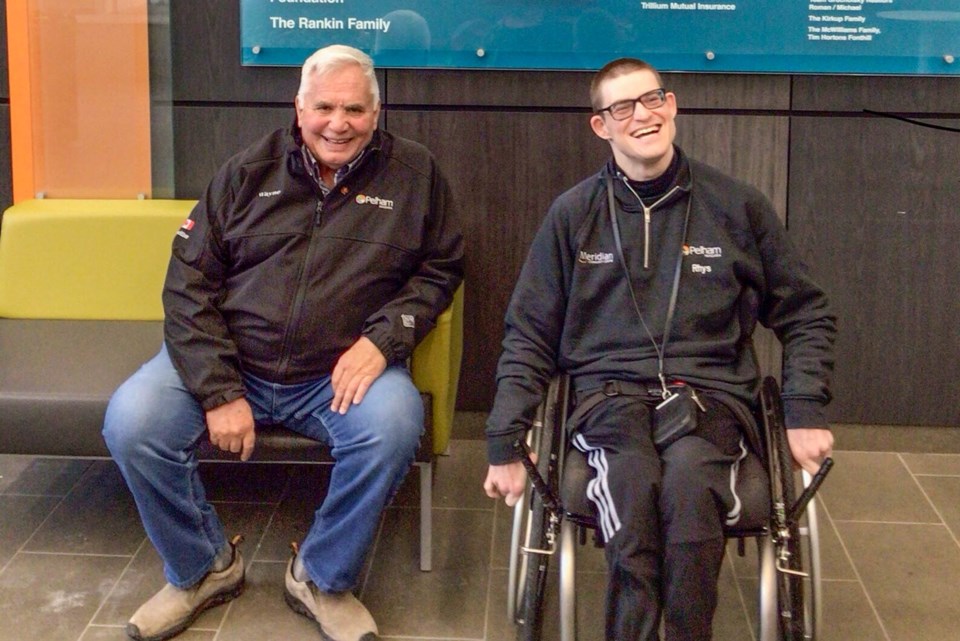I have been fortunate to have a lifetime of wonderful coaches who have enriched my life and taught me the value of a lifetime of learning. They helped me determine a long time ago that I will always be the greenest of rookies when it comes to the Game of Life. One person who has helped me find a better understanding of myself in recent years is my young friend Rhys Evans. He and I are pleased to respond to the invitation to collaborate on an article about inter-generational coaching for PelhamToday.
You might have encountered Rhys as he welcomes people at the MCC. Nobody speaks more boldly about his commitments and his intentions than Rhys. He has the power to change the face of things by his presence alone. In this way he has become a coach to me. We share the foundational goal of equity, particularly when it comes to equity in transportation and accessibility.
Our interest and vulnerability on the topic of transportation bring Rhys and me together. The gap between the objective of equal access to public transportation and current realities is apparent to all of us. As a Pelham Town Councillor, I experience the frustrations of not yet being able to deliver the equity of transportation that we know is needed so badly. Rhys experiences the real, larger and much greater inequities of higher fares and unavailability as a rider.
Left to ourselves, we will be only as good as we can see ourselves to be. We stop when we are tired, hurt, bored, disillusioned, satisfied, or happy. This usually means we stop short of the goal, especially if the goal is momentous. When there’s an extraordinary goal like transportation equity to achieve, ordinary just won’t do. This is where coaching relationships can be of great assistance. Coaching is not about devising a vision for people and then persuading them to be compliant. Rather it empowers, encourages and authorizes others to meet the goals they have set—and more. It helps people clarify their values in light of changing realities.
Coaching is, above all, a learning profession. Good coaches are themselves coach-able, which can lead to innovation and creativity. Put simply, if you can’t be coached, you can’t be a coach.
Put simply, if you can’t be coached, you can’t be a coach
I find that Rhys has the powerful ability to expand my willingness to be coached. We have each become more coach-able because we are committed to a future that we can’t reach by ourselves— the difference in our ages is an opportunity, not a barrier.
His ability to welcome everyone is Rhys’s single most important skill. It is really a way of being for him. When he is welcoming, people follow Rhys naturally and want to participate with him to achieve goals. Others are inspired to see new possibilities and commit to them. His coaching of me always emphasizes the interdependence of people.
People participate when they are moved, inspired, or called into action. We frequently make the mistake of engaging others because we want them to have the same point of view or opinion. Rhys’s approach sees and acknowledges the commitments of others and helps provide an opening for action and more freedom.
Rhys and I share the belief that coaching is for everyone and opportunities for coaching are available to all of us every day —within and across the generations. People want to work on difficult questions in ways that offer meaning for their lives. We can do this together.
And finally, we have evolved laughter as a form of social bonding. If you are looking at the ability to share problems, then you're probably looking at the ability to have a good laugh with someone else. In formulating our coaching relationship, Rhys and I speak about what we care about. As others have said, “A problem shared is a problem halved.”
Our message to the reader, Be true to yourself, that’s the key to happiness.
The person who is a Master of the Art of Living makes little distinction between their work and their play, their labour and their leisure, their mind and their body, their education and their recreation, their love and their religion. They hardly know which is which. They simply pursue their Vision of Excellence and Grace in whatever they do, leaving others to decide whether they are working or playing. To them it's always doing both. —From a Zen Buddhist text.
Rhys Evans is on Town staff at the Meridian Community Centre, and Wayne Olson is a Ward 1 Pelham Town Councillor.


